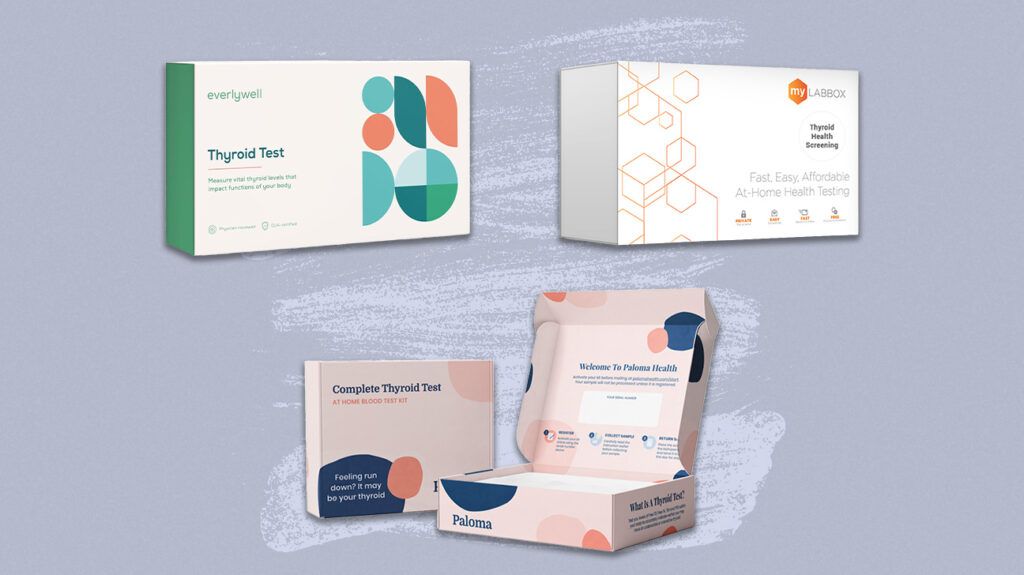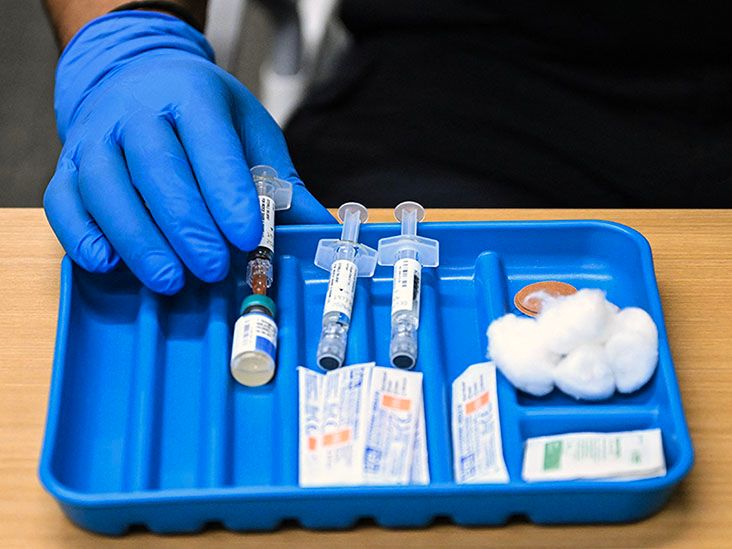The best at-home thyroid test kits make monitoring thyroid hormones easier. Most have flexible spending account (FSA) and health savings account (HSA) coverage. Learn about the best at-home thyroid tests here.

If you want to carry out a thyroid test, you may consider one of the following from these popular companies. None of these companies state that the Food and Drug Administration (FDA) approves their thyroid tests.
The table below compares the cost of the different tests within this article.
All products require a finger prick to collect a blood sample.
| Product | Tests for | Results in | Accepts insurance | Price |
|---|---|---|---|---|
| Paloma | TSH, free T3, free T4, TPO antibody levels | 1 week | FSA/HSA only | $119 |
| Everlywell | TSH, free T3, free T4, TPO antibody levels | a few days | accepts HSA/FSA | $149 |
| myLAB Box | TSH, free T3, free T4, and TPO antibody levels | 2 to 5 days | FSA/HSA only | $125 |
We selected these at-home thyroid tests based on criteria we think are good indicators of safety, quality, and transparency.
As a part of our vetting process, we consider:
- the product’s composition and overall quality
- any third-party certifications
- the company’s reputation and business practices
- marketing claims
- customer reviews
- what the test checks for
- how quickly results are available
- cost and insurance options
Learn more about how we vet products and brands.
At-home thyroid tests typically measure several thyroid hormones, including:
- TSH: This regulates the production of thyroid hormones T3 and T4. High levels of TSH may indicate an underactive thyroid, while low levels may suggest an overactive thyroid.
- T4: The main hormone that the thyroid produces. T4 plays an important role in digestion, muscle function, bone health, and metabolism regulation. It can be bound and free, with bound T4 unable to enter body tissues.
- T3: Together with T4, T3 is responsible for many bodily functions, including heart rate, body temperature, and metabolism. It also can be bound or free.
Some tests also check for thyroid antibodies, which can indicate the autoimmune disease Hashimoto thyroiditis.
The results of thyroid testing help you determine whether you need to consult a doctor.
Using a testing kit typically involves taking a finger-prick blood sample, placing the sample in a plastic bag, and returning it to the company in the provided envelope.
Each testing kit has specific instructions, and it is essential to follow these carefully to ensure an accurate result.
Some testing companies also have a doctor review your results. If you prefer, the company may be able to send the results to your regular doctor.
It is important to note that several things can interfere with thyroid test results, affecting the test itself or your thyroid hormone levels.
Examples that affect thyroid hormone levels include:
- pregnancy
- underlying health conditions
- some medications, such as estrogen, and biotin supplements
- advancing age
Pros and cons of using an at-home thyroid test
At-home testing offers
- convenience
- cost-effectiveness
- quick results
- confidentiality
However, some disadvantages may include:
- lack of physician guidance
- a risk of choosing the wrong test or misinterpreting the results
- the potential for false positive or negative readings
- quality control concerns
- that follow-up testing may be necessary
Do private medical insurance plans cover the costs?
Most private health insurance companies do not cover the costs of at-home testing.
However, some at-home test companies accept payments from FSAs or HSAs.
Initial research suggests that at-home tests and telehealth consultations can expand screening for thyroid conditions such as underactive and overactive thyroid.
However, research into the accuracy of at-home tests is limited. The risk of collecting an unusable sample is higher when using an at-home test, so it is important to read and follow any instructions from the manufacturer carefully.
Using companies that analyze samples in Clinical Laboratory Independent Amendments (CLIA) and College of American Pathologists (CAP) certified labs may involve higher accuracy. These labs must meet strict state and federal standards to have certifications.
It is advisable to contact a doctor or healthcare professional for help interpreting your test result. You may need further tests to confirm or rule out a health condition.
Usually, only people with symptoms of an overactive or underactive thyroid will find a thyroid test helpful.
Symptoms of hypothyroidism, or an underactive thyroid, may include:
- fatigue
- extra sensitivity to cold temperatures
- constipation
- weight gain
- irregular or heavy periods
- depression
- a slow heart rate
- joint aches and pains
- a puffy face
Symptoms of hyperthyroidism, or an overactive thyroid, may include:
- nervousness
- weakness and fatigue
- extra sensitivity to hot temperatures
- problems sleeping
- a hand tremor
- diarrhea
- weight loss
Learn more about the thyroid’s function.
A blood test showing a high level of TSH may indicate hypothyroidism.
Higher levels of TSH and T4 levels in a typical range may mean a risk of developing hypothyroidism in the future.
If your test results show you to have low TSH levels and higher levels of T3 or T4, it may suggest hyperthyroidism.
However, it is important to discuss any at-home thyroid test results with a healthcare professional to ensure you are interpreting the results correctly.
Once you receive the results of your at-home thyroid test, you need to speak with a doctor who can review the results and advise on the next steps.
However, whether you have taken a thyroid test or not, you can look out for some symptoms of a thyroid condition. For example, someone with hypothyroidism can present with symptoms such as fatigue. However, whether you have taken a thyroid test or not, you can look out for some symptoms of a thyroid condition. For example, someone with hypothyroidism can present with symptoms such as fatigue, constipation, weight gain, and a heightened sensitivity to colder temperatures.
Someone with hyperthyroidism, on the other hand, can present with symptoms such as nervousness, weakness, weight loss, and heightened sensitivity to heat.
If you experience any of these symptoms or any of the others listed in this article, speak with a doctor or healthcare professional as soon as possible to determine the cause.
Yes, you can check your thyroid levels at home with an at-home test. You will need to collect a sample — usually a finger-prick blood sample — and send it to a laboratory. You can get your results within a few working days.
You can get a thyroid test without going to a doctor by purchasing at-home test kits online.
Knowing and noticing the signs and symptoms of hypothyroidism can alert you to a possible thyroid condition.
However, getting the results of an at-home test can then help you decide whether you need to speak with a doctor or healthcare professional.
There is little research into the accuracy of at-home tests.
You must follow the test’s instructions carefully to ensure you collect a valid sample.
You can also prioritize getting tests from companies that use Clinical Laboratory Independent Amendments (CLIA) and College of American Pathologists (CAP) certified labs.
At-home thyroid tests can be more convenient than visiting a clinic, which may help some people manage their health.
People can often access their results in a few days and review them with a doctor or healthcare professional. If you receive a positive result, an appropriate healthcare team can help you develop a treatment plan that best suits your needs.


